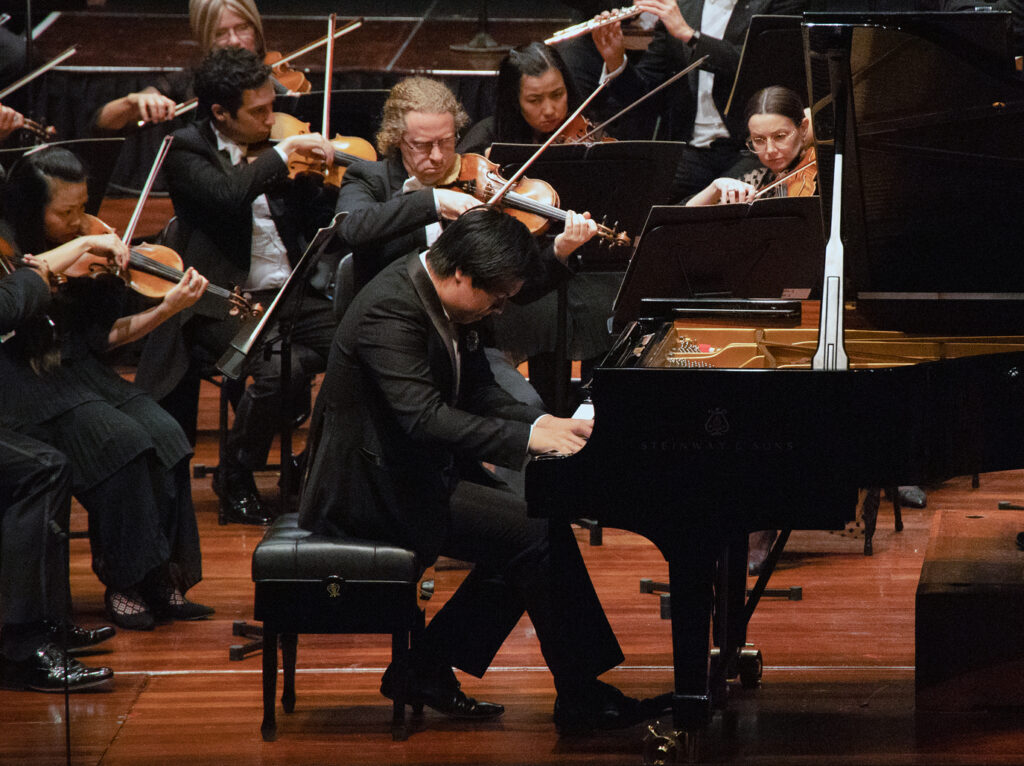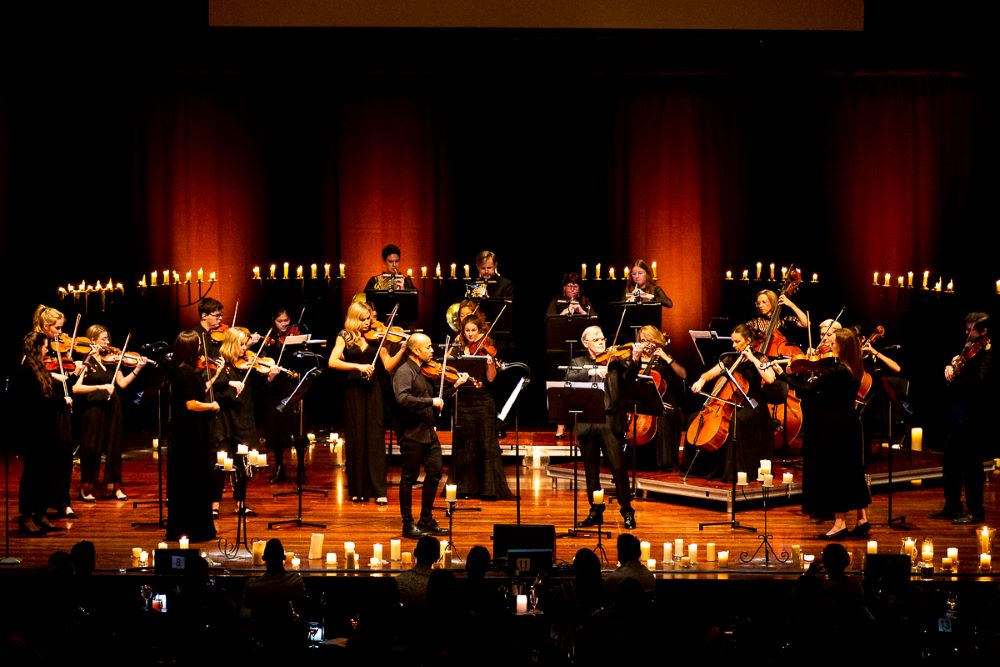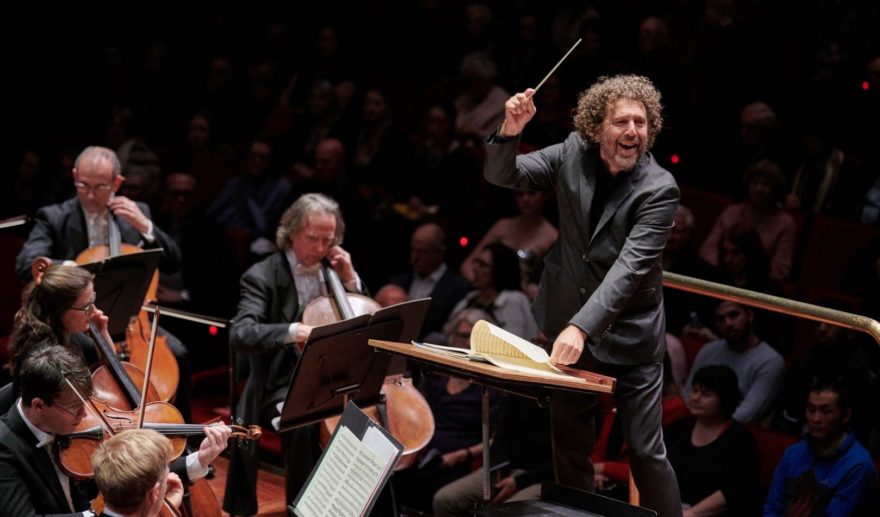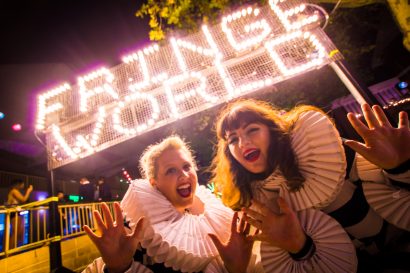Are you put off by the idea of classical music as high-brow and inaccessible? Bourby Webster has 10 tips to help you have the experience of your life at an orchestral concert.
How to listen to an orchestra
11 April 2022
- Reading time • 10 minutesMusic
More like this
- Rewriting tradition with skill and charm
- Close encounter stirs the soul
- The great unknown
A concert by a symphony orchestra is a magical experience. Some of the music might be 400 years old, yet it portrays human emotions as accurately as we feel them today. Symphonic music can take us on journeys that cover almost every landscape and country. It can make us laugh, cry and feel inexplicably alive in a way very little else can.
Going to an orchestral concert can also be a daunting prospect for anyone who hasn’t been before or who remembers being dragged along as a child and being made to sit in silence in what seemed like an endurance test.
Seeing a live band as big and powerful as an orchestra has the potential to be a dramatic, deeply moving and incredibly intense experience. With a little preparation, you might just experience something absolutely mind-blowing!
As founder of Perth Symphony Orchestra, my number one aim was to introduce local people to the orchestra in an accessible way and start them on a journey of listening to classical music.
These 10 easy steps on how to listen to an orchestra will help you prepare for the orchestral experience of your life.
1. Plan what you are going to see
There are thousands of pieces of symphonic music written in the classical (1750-1830), romantic (1830-1900) and 20th century periods, and even more being written by composers today. Some are easier listening than others. Ask any classical musician and they can tell you their favourite symphonies and which one to choose depending on whether you are looking for intense, stormy, uplifting or something to hum along with. Or simply Google “Top 10 Symphonies” and you can’t go far wrong.
Selecting a program with a concerto – a symphonic composition featuring a solo instrument – is a great idea. Having a soloist out front of the orchestra and playing to you, where you can see their breathing, their expressions and their fingers moving, is fascinating and adds to the enjoyment.

2. Listen in advance
If the Rolling Stones played a bunch of new tunes and included none of their hits, the audience would revolt! People love to hear what they know. (Watch this TEDx talk to find out why). It’s no different with classical music. Knowing a “good bit” (aka a climax) is coming and then experiencing that magical moment, is part of what makes it an amazing experience. Some people fall in love on the first listen, but this is very rare!
So make sure you get to know the music on the concert program before you go: watch a film containing the music, or stream online to relax and switch off from the world before bed. Listening to classical music while working, doing chores and meditating are rituals for me.
3. Sit up close and personal
Symphonies are played in concert halls because the acoustics are incredible. The music will sound good no matter where you sit, but seeing an orchestra in action is awesome – particularly a soloist. If you’re heading to the Perth Concert Hall, I would consider the choir stalls behind and above the orchestra where you can see the conductor; they are the epicentre of the action and it fascinating to see how they move, who they gesture to and how their facial expressions affect the musicians.
If you want to see the musicians, particularly the violins and cellos, then seats in the auditorium 10-15 rows back from the stage are definitely the place to be.

4. Eat before you come
If you are coming straight from work, try to get something warm inside you on the way. Some venues, such as the Perth Concert Hall, have pre-concert food options. If you don’t manage to eat, sitting hungry and tired and in your work clothes for a concert is a total vibe killer. And a red wine on an empty tummy in the interval is only going to make things worse!
5. Read the program
If you have done step two you now know the music well – but do you know why it was written? And for whom? The program gives really interesting insights into the music, including why it was composed and what to listen out for. It serves as a guidebook – those who like to research their overseas holiday before they go, so they know what to expect, will know what I mean!
6. Attend a pre-concert talk
You’ll learn even more about the music than what is in the program, and often the person speaking has experience of the music. Hearing them talk about what they love about the piece and how to listen to an orchestra can enhance your own enjoyment tenfold!

7. Know how to behave
Yes, there are some rules at a classical music concert! But these are in place because they really do help the enjoyment of the music. Hearing 76 musicians play whisper quiet and oh-so-beautifully can be totally ruined by one cough lozenge wrapper being crackled. Clapping rapturously between movements when everyone’s minds are mesmerised can break the incredible bliss of silent appreciation. A concert is a mindful and meditational experience – and current thinking says we need more of this in our lives. So go with it and see how you feel!
8. Learn how to listen
There is no right or wrong way when it comes to listening to an orchestra. I always start by watching the conductor. They are the glue holding the music together and the leader who brings the expression. Big movements from the conductor usually mean it’s going to be loud. Small movements, it will be quiet. Sharp movements and it will feel exciting, maybe scary. Gentle, caressing movements and you’ll likely feel the music flow over you like silk. See how their movements change what you hear.
I then often follow a melody. Just like pop songs where the chorus comes back time and time again, so too will a great melody. Listen to see who is playing it, and to whom it is passed. Does it change the mood depending on the instrument?
Also, the orchestra works as a rock band would – with rhythm, harmony and melody plus some great shredding solo sections that get your heart racing. Hearing the brass work together is awe-inspiring. When they’re all at full pelt it’s usually a heroic moment or celebration, and it can lift the roof. The woodwinds bring deep emotional qualities. They very often pass melodies around, and the different instruments each have such different personalities. Percussion adds so much texture and seeing them both supporting and leading the body of sound from the musicians below them, can be enthralling. The strings are the rich, lush ocean that carries everything else. Try listening for individual instruments, but also sections.

9. Make friends with a musician
I’ve had friends who were not classical music fans love a concert because they came to see me in the orchestra. Knowing someone on stage can make it a really different experience, seeing them play, knowing they’re part of this huge incredible sound. They can also share gossip (let’s face it, we loved to read all the scandals about Warnie in the paper as much as we loved to watch him play!), explain why they love the piece so much and more!
10. Take someone with you who loves classical music
Take a friend who loves classical music, can explain things to you and point things out. You can hardly enjoy the experience if you go with someone who doesn’t really want to be there and spends the entire time trying to surreptitiously use their mobile phone under their jacket. Ask a friend who you know loves classical music – perhaps they can even suggest what concert to see. Experiencing something incredible together might lead to a friend for life!
With these points in mind, it’s time to take the plunge and book a ticket! Here are some concerts coming up in Perth that are worth checking out.
13 April, “Messiah”, WA Symphony Orchestra and St George’s Cathedral Consort
22-23 April “Dvorak’s New World”, WA Symphony Orchestra
7 May “The Brush and the Bow”, Australian Baroque
18 May “Mozart and Britten”, Australian Chamber Orchestra
27 May “Turbulence”, UWA Conservatorium of Music
17 June “Synthony”, Perth Symphony Orchestra
Big and powerful: The West Australian Symphony Orchestra commands the stage at the Perth Concert Hall. Photo supplied
Like what you're reading? Support Seesaw.






